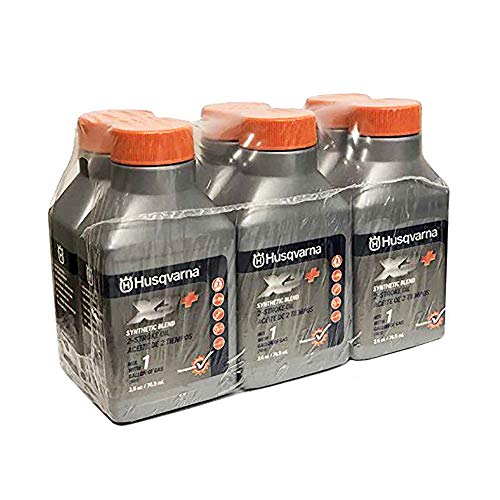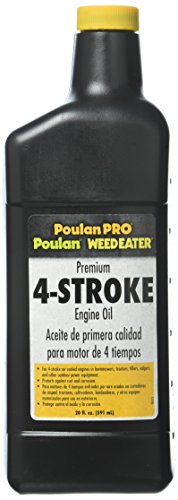Proper refueling habits are key to lawn mower efficiency that can also extend its service life considerably. Yet, with the market full of all kinds of products, it may be a challenge to find the best oil for your lawn mower. Using one that’s poor quality or simply wrong for your machine, however, can result in damage to the engine and will almost surely increase its wear.
There are a number of parameters to consider apart from the manufacturer’s directions, so I thought it might be a good idea to share my personal favorites depending on the conditions that you’re working in to prevent you from making suboptimal decisions. Below are seven products that do a great job of keeping the motor happy and there might be the best oil for your lawn mower engine.
Affiliate links and images placed from the Amazon Product Advertising API on 2025-11-09
7 Best Oils for Lawn Mower
Feel free to use this article as a guide to choosing oil for your lawn mower.
1. Honda PK2 Motor Oil: The Best Motor Oil for a Lawn Mower 4.9/5
Affiliate links and images placed from the Amazon Product Advertising API on 2025-11-09
Honda is a brand that hardly needs to be introduced. With a history of over 70 years and about six decades in the US market, this Japanese company has long won a reputation for producing reliable power equipment aside from its key focus on automobiles and motorcycles.
This product is highly recommended to anyone who proudly owns a Honda-made grass cutter. It’s safe to say that the best oil for a Honda lawn mower should be by Honda, too, and that’s what the manufacturer stresses in its manuals. It will also work perfectly fine for any other brand as long as you have a four-stroke engine (please mind that two-stroke models generally require special formulations).
It is an SAE 10W30 oil, and here’s how you interpret the code. The first three letters stand for the Society of Automotive Engineers, the organization whose grading system the product complies with. The two numbers separated by a W are viscosity values at cold and hot engine temperatures, respectively. The lower the number, the thinner the oil’s texture, meaning it will flow freely when cold. The fact that we have two values here indicates that this is a multi-viscosity oil using so-called viscosity index improvers as an additive, which enables the product to adapt its resistance to flow depending on the temperature. This brings about increased climatic versatility, also providing excellent start-up protection. W stands for winter, suggesting that it’s fit for use in the cold season (without precluding summertime operation).
One disadvantage of viscosity index improvers is that these polymers are prone to what is called shearing, a mechanical process that reduces their ability to increase viscosity at higher temperatures (which is what they are added for). What makes this Honda lawn mower oil so good is that it contains shear-resistant viscosity index improvers, combined with premium quality base stock for additional engine protection.
Honda PK2 is an excellent all-season oil for a Honda lawn mower or any brand as long as it has a four-stroke engine. I’ve been using it for years now, and it’s never failed to ensure a smooth start. Although it’s not the most affordable option, I definitely recommend it as the best oil for a riding lawn mower or a 4-cycle push type.
- All-season oil that’s fit to use in moderately cold winter
- Multi-viscosity helps resist thermal breakdown
- Shear-resistant viscosity index improvers for extra engine protection
- Two bottles per package discount option available
- Not particularly inexpensive
2. John Deere Turf-Gard Oil: Specialized Lawn Mower Oil for Extra Protection 4.8/5
Affiliate links and images placed from the Amazon Product Advertising API on 2025-11-09
John Deere is another big name in the industry that’s probably familiar to you. Founded back in 1837 in Illinois, where it still has its headquarters, it is today one of the leading US manufacturers of agricultural and forestry machinery as well as lawn care equipment.
As you can see from the code, this Turf-Gard SAE 10W30 oil has the same viscosity parameters as the abovementioned product by Honda. Being a multi-viscosity item, it is safe to use in more or less mild winter and all year round. Again, it is designed specifically for 4-cycle engines, so I advise strongly against using it to lubricate a two-stroke engine. The manufacturer offers a list of engine markings that show compatibility with this oil if you are using a John Deere grass cutter.
This product belongs to Turf-Gard, a trademark of Deere & Company specializing in lawn and garden equipment such as tractors, commercial-grade lawn mowers, and much more. It’s designed specifically to protect the engine against wear by ensuring consistent and efficient lubrication at start-up as well as during operation. The manufacturer also emphasizes that the oil will keep your engine clean by removing particles of dirt, and my experience confirms it, at least after about one season of using it. I enjoyed buttery-smooth operation throughout the time, with no sign of smoke or excessive wear to the engine.
If you own a John Deere 4-stroke lawn mower, this is exactly what the company recommends using to make sure your warranty stays in effect.
- Can be used during the winter unless extremely cold
- A versatile multi-viscosity product for better start-up and performance in operation
- 2 x 1-quart bottle pack available
- Designed specifically for lawn care equipment
- Relatively pricey
3. Briggs & Stratton Motor Oil: The Best Oil for a Push Lawn Mower 4.8/5
Affiliate links and images placed from the Amazon Product Advertising API on 2025-11-09
Briggs & Stratton is yet another US-based company with over a century of experience, focusing primarily on gasoline engines and accessories and spare parts.
This oil is made specifically for small two-stroke, or two-cycle, engines, meaning that oil is mixed with fuel in the fuel tank. Most lawn mowers that run on a 2-stroke motor are the so-called push type, although there are a number of self-propelled riding grass cutters that utilize this design.
When it comes to adding oil into your two-cycle lawn mower, ease of mixing matters greatly. This product is extremely convenient in this respect as it comes in a measurement-friendly bottle. You’ll thus know exactly how much oil you are adding to get the right gasoline-to-oil ratio.
The composition of this Briggs and Stratton oil allows it to be used at a ratio of up to 50:1, which is more than adequate for our purpose since most mowers are fine with 32:1 to 40:1. Personally I used it to lubricate by old walk-behind grass cutter and found it to be excellent. The only disadvantage is that the oil is highly fluid, meaning it won’t last as long as you’d probably like it. On the other hand, the performance benefits highly from this feature, ensuring smooth operation in cool conditions.
The manufacturer emphasized that this oil has an ash-free formula, making it friendlier to the environment as well as to the engine as this composition prevents characteristic deposits from forming at high temperatures. It also prevents gasoline in the mix from breaking down during storage due to a fuel stabilizer included in the formula.
All in all, you’ll almost surely appreciate this product if you’re looking for an effective lubricant for your two-stroke mower at a reasonable price.
- Affordable price
- Easy to use due to a measure included
- Ashless composition
- Eco-friendly
- Keeps the engine clean
- Features an oil stabilizer
- Lasts less than ideal
4. Echo Power Blend Oil Mix: An Easy-to-Use Option 4.8/5
Affiliate links and images placed from the Amazon Product Advertising API on 2025-11-09
ECHO Inc. is part of the Japanese Yamabiko Corporation and one of North America’s leading manufacturer of professional power equipment for commercial use as well as homes. It was officially established in Illinois back in 1978, originally importing Japanese-made high-performance 2-stroke engines. However, it soon started to introduce its own products designed more specifically for the US market, including a variety of grass trimmers.
Power Blend is a specialized two-cycle motor oil meant to be mixed with 89 and up octane gasoline. It features an engine care formula that includes detergents for dissolving dirt particles as well as a fuel stabilizer that prevents degradation of gasoline over 30 days and more. It is a semi-synthetic oil blend, meaning it consists of mineral and synthetic oils, which can be mixed with fuel really easily to obtain a ratio of 50:1. The product comes in small, single-use 2.6 oz bottles, one bottle per gallon of gasoline for the above ratio. Although extremely convenient, I find it to be a waste of packaging material and thus abstained from purchasing the oil back again when I had the old 2-cycle grass cutter. The temptation was considerable, though, since my neighbor was, and is, delighted by the smooth, low-smoke operation it ensures.
Although originally an ECHO part, this oil can also be used with other lawn mowers that have two-stroke engines installed.
- Excellent lubricating ability
- Easy to use due to the one-bottle-per-gallon formulation
- Contains detergents to keep the engine clean
- Made with a fuel stabilizer
- Not the cheapest option
- Single-use bottles aren’t really environmentally conscious
5. Husqvarna XP+ 2 Stroke Oil: The Best Low-Smoke Push Mower Oil 4.7/5
Affiliate links and images placed from the Amazon Product Advertising API on 2025-11-09
Based in Sweden, the Husqvarna Group is truly a giant in the global market of power equipment for outdoor use, from chainsaws to lawn mowers – yet another well-trusted name on the list! Founded as long ago as 1689, the brand boasts an unbelievably long history of over three hundred years. However, it wasn’t until the early 20th century that is focused on grass trimming and the like, adjusting the facilities to new products as demand for old highlights declined over time.
Husqvarna’s XP+ 2-Stroke Oil was developed with maximum performance in view for 2-stroke engines and tested on each and every of the brand’s mowers of the type. What makes it a really excellent motor oil for a lawn mower where oil and fuel are mixed is a well-balanced combination lubricity, cleaning ability, and reduced exhaust output. It complies with the stringent JASO-FD standard for 2-stroke engines developed by the Japan Automobile Standards Organization.
Unfortunately, I don’t have any personal experience with this product, but a friend of mine sticks to it as tight as he sticks to his push mower. When I talked to him about the best oil for a lawn mower of that type, he explained that Husqvarna’s oil generates way less smoke than other, average brands do. This is what the manufacturer emphasized when describing the formulation, too.
Finally, the product is easy to use as it comes in the same 2.6 oz bottles as the previous oil — a time saver, though not exactly an eco-friendly solution.
- Exceptionally little smoke
- Easy to mix into a ratio of 50:1
- Contains detergents to keep the engine clean
- Made with a fuel stabilizer
- Above-average price
- Single-use plastic bottles don’t help save resources
6. Toro Oil 18 Oz Bottle: Excellent Single-Grade Oil for a Lawn Mower 4.6/5
Affiliate links and images placed from the Amazon Product Advertising API on 2025-11-09
The US-based Toro Company is an impressively versatile business that’s well-known for its outdoor environment solutions for golf courses and other sports fields. It also offers a wide variety of homeowner products, including grass trimmers and lawn mowers, and a line of irrigation solutions. Long story short, it is a brand that knows a thing or two about land and how to use it.
As the code duly suggests, Toro 38916 is an oil that has a viscosity value of 30 as rated by the Society of Automotive Engineers. While also intended for four-cycle engines, it’s different from the Honda and John Deere products mentioned above in that it doesn’t belong to the multi-grade category. This means it’s somewhat less flexible in adapting to ups and downs in temperature throughout the year. The ability, however, usually comes at a cost of mechanical shearing, causing changes in viscosity as the engine gets hot. The key takeaway here would be that single-grade oils like Toro 38916 are a safe choice in areas where temperature is more or less stable, since engine heating is relatively hard to avoid. The product thus ensures stable viscosity at moderate to high temperatures without offering too much coverage for the winter season
The manufacturer also emphasizes that the product will meet, if not exceed, the requirements of all its equipment provided that it’s of the compatible type. As a bonus, the oil comes in an 18 oz bottle that’s neither too big if you want to try it for the first time nor too small to call it a waste of plastic. I did order one just to test it and found the operation quite smooth, also the start felt somewhat less immediate than it does with my No. 1 pick.
- Shear-proof single-grade formulation
- Smooth low-smoke operation
- Reliable in areas where the temperature is stable
- Relatively expensive
- Not the best option for cool start-up
7. Poulan Pro Engine Oil 20oz: Recommended Oil for a Lawn Mower for Rust and Corrosion Prevention 4.7/5
Affiliate links and images placed from the Amazon Product Advertising API on 2025-11-09
Poulan Pro is one of the many sub-brands of Husqvarna Group, mentioned above. It emerged originally as a more upscale extension of Poulan, a line of affordable middle-market outdoor power equipment and accessories.
The oil comes in a 20 oz plastic bottle, just enough for an occasional refill or first try. It is another product rated SAE 30, meaning it has less potential for low-temperature operation as compared to multi-grade oils but also is less at risk of mechanical shearing. The label specifies that Poulan Pro Lawn Mower Engine Oil meets a number of regulations such as the applicable API Standards.
Just like most oils rated SAE 30, this product is safe to use above 40 degrees Fahrenheit but isn’t the best choice for a cold winter. What makes it special, however, is enhanced rust and corrosion protection. Since these are both serious problems that affect your mower performance dramatically, I find this feature a useful addition. Most oils are not at all immune to the oxidation process, thus causing the engine to oxidize as well, but Poulan Pro seems to have solved the problem.
I’ve recently purchased a bottle of this oil for a change as I’m always curious to discover what’s beyond my all-time favorites, and I do believe it’s a quality oil, although not the most smoke-free option. One improvement I’d appreciate, though, is a bigger bottle.
- Not especially shear prone due to a single-grade 30 W formulation
- Good throughout the warm season
- Rust and corrosion prevention
- Only 20 oz bottles available
- Pricier than average
FAQ on the Oil for a Lawn Mower
What kind of oil should I use for my lawn mower?
Which oil to use largely depends on the type of your equipment.
First of all, there are 2-stroke and 4-stroke engines, alternatively referred to as 2-cycle and 4-cycle, respectively. These are two different technologies that require their respective specialized oils. In the former engine type, fuel is mixed with oil for lubrication, which explains more stringent requirements to 2-stroke motor oils. First and foremost, such products need to have reduced ash content to minimize deposit formation as the oil is burned within the engine. Secondly, it’s essential that such oil uses a fuel stabilizer to prevent the whole mix from becoming unfit for use over time due to chemical transformation.
When it comes to 4-stroke oils, the key parameter to be taken into account is their viscosity rating. Multi-viscosity products such as SAE 10W30 and SAE 5W30 are colder-friendlier but also prone to degradation as the engine heats up, while single-grade oils (marked SAE 30W or similar) are generally more reliable in areas where the temperature is more or less stable. There are other options for more heavy-duty applications such as commercial use and extreme cold, too, but they are less common.
How Much Oil for a Lawn Mower Should I Use?
The exact amount of oil that your particular model needs is most probably stated in the manual. However, there’s a rule of thumb to help you make the decision depending on the general technology type.
How much oil you need to put into a mower depends predominantly on whether it’s walk-behind, or push type, or a riding lawn mower. The former will generally take between 15 and 18 ounces and requires a replacement after every 50 hours in operation (or annually, whichever is earlier). The latter consumes about 50 to 65 ounces but lasts for 100 hours unless a year lapses first.
How to Change Oil in the Lawn Mower?
Once again, the specific steps will depend on the manufacturer’s directions. For most mowers, however, the procedure is approximately as follows. Warm up the engine for some time to make sure that the oil flows freely inside the engine. Get an oil pan or tray, or basically any suitable container, and place it underneath the oil fill as you put the mower on its side. Unscrew the cap and drain the old oil, waiting for a couple of minutes until nothing is left. Then add fresh oil in the amount specified for your mower, using the dipstick to control the oil level. Remember not to hurry as this increases the risk of overfilling. Finally, wipe the area around the oil fill and screw the cap on.
When to Change the Oil?
As I’ve already mentioned above, how many hours your mower can work without oil replacement depends on its type as well as specifications. The average interval is 50 working hours for push mowers and about double the number for riding models. Some mowers, however, will only last 20 hours, so be sure to check the manual.
You might need to replace oil more often if operating conditions are challenging. These include wet grass, heavy fogs, and generally humid weather. Checking the state and level of oil is a very good habit that might extend the equipment’s service life considerably.
Finally, it’s essential to change the oil after about 5 hours of using a new lawn mower.
Takeaways
Oil is key to mower performance and service life, so it’s worth investing in the right product. Apart from engine type, your decision should be based on the weather conditions you’re most likely to have, as this will influence the viscosity rating.
Although it’s probably the safest option to use Craftsman lawn mower oil if you have a Craftsman mower, this isn’t necessary at all since high-quality oils will normally meet the requirements of essentially any equipment. And let me say it once again, don’t miss Honda PK2 if you’re using a 4-stroke engine model!
Do you have a favorite mower oil already? If yes, which?









